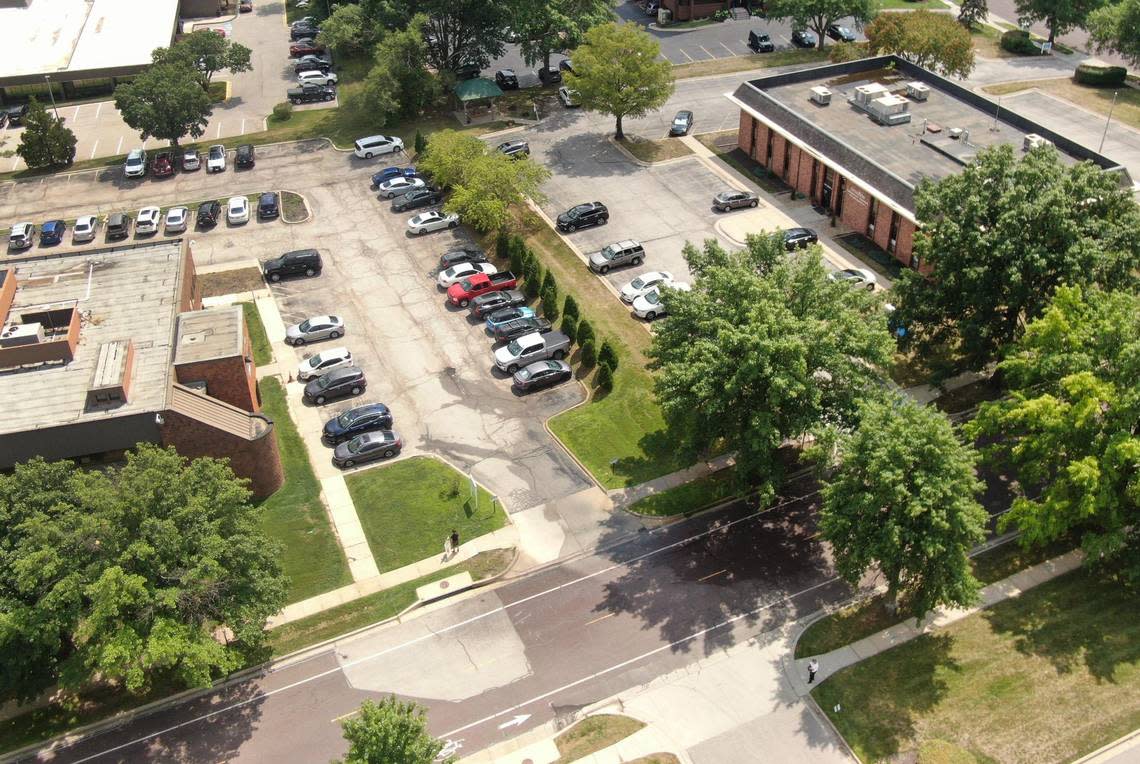‘Fake clinics’? Here’s the new abortion ‘front line,’ in a corner of Johnson County
The two driveways are side by side on a curvy stretch of 109th Street in Overland Park.
One leads into the parking lot of Planned Parenthood, where, among other things, women can receive abortion services. The other belongs to Advice & Aid Pregnancy Centers, a nonprofit crisis pregnancy center where the mission, steeped in Christian faith, is to talk women away from abortion.
Every now and then someone trying to get to Planned Parenthood accidentally turns into the wrong driveway and winds up in the lobby of Advice & Aid. That’s what brought nearly 100 walk-ins through the door in 2020.
GPS gone bad? Hand of God? Advice & Aid’s executive director, Ruth Tisdale, muses about that on the center’s website.
“When you drive down 109th St. and turn into our driveway it is easy to see why women often ‘accidentally’ end up at our office. Our driveway is parallel to the one that leads to the abortion clinic. Two driveways. Two paths. Two choices. Each with very different outcomes.
“The Bible talks about two paths also, the straight and narrow path that leads to life and the wide and crooked path that leads to destruction … It amazes me how our presence in this corner of Overland Park is a living picture of what this Bible truth speaks on.”

And if supporters have their way, the numbers and scope of these anti-abortion crisis pregnancy centers will only grow, while critics continue to label them “fake clinics,” calling their marketing “misleading.”
Taxpayer funding of centers nationwide has escalated fivefold over the last decade, thanks to efforts of legislators in mostly Republican-led states. States are supporting the work of anti-abortion centers at the same time they’re banning or limiting abortion.
Missouri already led all but two states in providing tax dollars to such centers — nearly $45 million since 2010, according to an Associated Press analysis. Now as almost all abortion is outlawed in the state, taxpayers can claim even more tax credit for their donations to the centers.
In Kansas, where voters last month overwhelmingly affirmed the right to an abortion, lobbyists plan to ask for increased state funding for the centers. More money could buy more ultrasound machines, which the centers use to encourage women to carry a pregnancy to term.
To counter criticism that the centers don’t provide medical care, some are hiring medically trained staff and putting registered nurses in charge.

Advice & Aid is one of about 2,500 crisis pregnancy centers in the United States, at least a dozen of them in the Kansas City metro, according to one national map. The map shows 73 centers in Missouri and 38 in Kansas.
“In general, the goal of a pregnancy resource center is to make abortion ‘unthinkable’ by compassionately serving women and meeting their needs through their pregnancies and after the baby is born, whether she chooses to parent or form a loving adoption plan,” said Debra Niesen, the lead consultant for Pro-Life Ministries for the Archdiocese of Kansas City in Kansas, which supports but does not run any pregnancy centers.
Niesen is seeing more parishioners coming to the cause, “reaching out to pregnancy resource centers to volunteer or support them financially.”
Alissa Gross senses change within the anti-abortion movement. The chief development director for Resource Health, which operates four crisis pregnancy centers in the Kansas City area, sees more consideration of “how can we do this better, what can we do to be better, more effective.”
“I think people are kind of going, oh gosh, it’s time to get involved in the culture war and do something about this rather than just sit by,” said Gross. “We can’t just sit by and say we’re the victims of mainstream media. That doesn’t work.
“We need to actively participate and be willing to get in the trenches and get our hands dirty and do what we need to do to change the cultural narrative instead of just being a victim of the cultural narrative.”
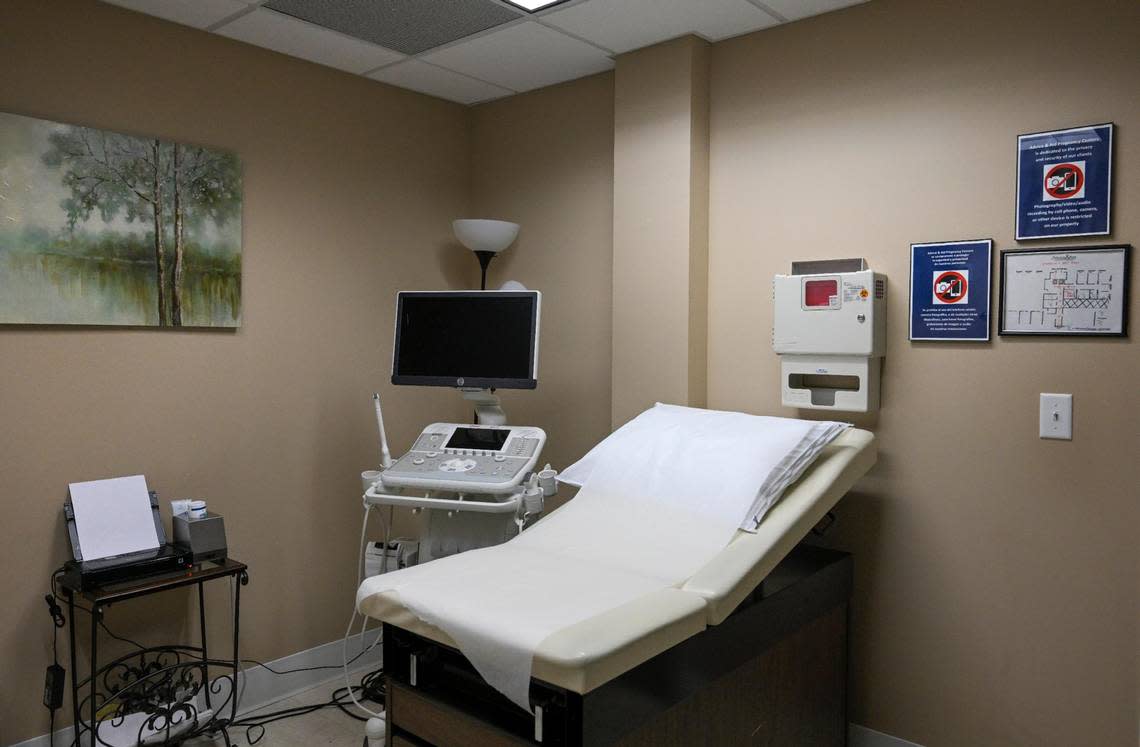
A target of critics
The first one in the country opened in the 1960s. But the fall of Roe v. Wade in late June threw the centers and their work into the volcano of the nation’s abortion debate. The heat rose quickly, violently in some cases. One Kansas City center learned of threats on social media and notified the police.
Crisis pregnancy centers have long been accused of misleading people into thinking they are full-service medical clinics that offer unbiased advice about pregnancy options. Generally, they are not licensed medical facilities.
Because they are not and their services are free, the centers are exempt “not only from laws and statutes specific to medical clinics,” but also federal and state business regulations, says a 2018 policy discussion in the American Medical Association’s Journal of Ethics.
Their practices are considered free speech, which “makes them much harder to regulate and provides them with a loophole to avoid scrutiny while providing information that does not conform to medical standards of care,” the AMA commentary said.
Just days after the U.S. Supreme Court overturned the 1973 decision that established a constitutional right to an abortion, the attorney general of Massachusetts, where abortion remains legal, issued a warning about crisis pregnancy centers.
In early August, Democratic Sen. Elizabeth Warren of Massachusetts called for a crackdown on “deceptive and misleading practices” and wound up in a debate on the Senate floor with Sen. Roger Marshall, a Kansas Republican, who countered that “the fraud and the deception is occurring in the abortion clinics.”
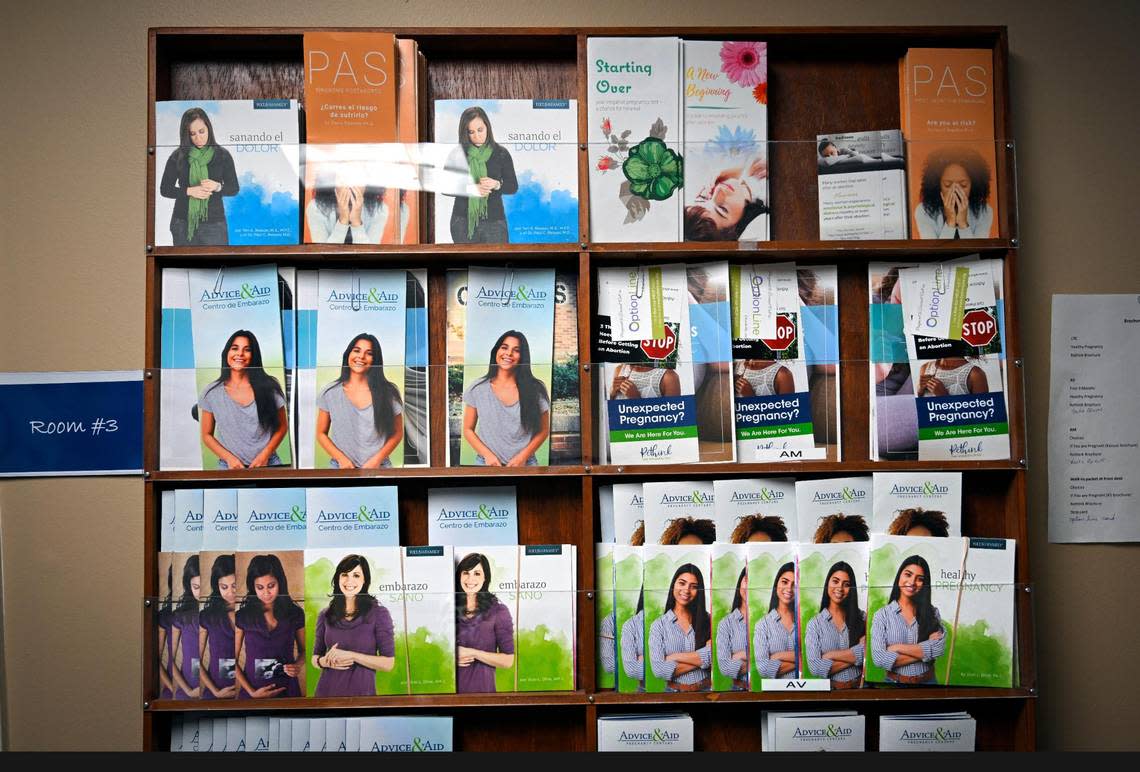
“The main concern with crisis pregnancy centers, in addition to the fact that many of them are getting state funding, is that they don’t provide health care services,” said Emily Wales, president and CEO of Planned Parenthood Great Plains. “They’re really there to persuade people not to have abortions.”
A few weeks ago, Planned Parenthood opened a new clinic in Wyandotte County, but it’s still struggling to keep up with demand from women coming to Kansas for abortions from states that now ban the procedure. Wales worries that some of them, unfamiliar with Kansas City, will mistakenly find themselves in a crisis pregnancy center.
Tisdale said her center is “always plain on the phone” that it is not an abortion provider, especially with women calling from out of state.
The internet hasn’t been a very helpful guide, but recently both Google Maps and Yelp said they would start identifying which is an abortion provider and which is an anti-abortion center.
Tisdale, who has worked at the center more than 17 years, is undeterred by criticism she’s heard many times before. She said Advice & Aid doesn’t try to hide its mission. Yes, the goal is to get a woman to become a parent or place the baby for adoption rather than have an abortion. But Tisdale said clients are not pressured, contrary to the experiences reported elsewhere — and to what her next door neighbors say patients have told them.
“Helping people is not a bad thing. And having a baby is not a bad thing. So why does abortion have to be the only choice for a woman who is facing an unplanned pregnancy? And why does the abortion clinic have to be the only place that offers information about pregnancy options?” said Tisdale. “Can you imagine if every women who had an unplanned pregnancy had an abortion?”
Even before this year’s Roe v. Wade decision threw gasoline on the abortion debate, some centers were taking stock of how they do business. Recent academic research finds that the centers are evolving, becoming “more medicalized and gaining government funding and support.”
Resource Health used to be known as Rachel House but rebranded itself five years ago and made changes like hiring registered nurses for each location.
“We decided to aggressively start looking at the arguments of the other side and say where is there legitimacy,” Gross said.
“There is an accusation that pregnancy centers are fake clinics, that they don’t have real medical professionals working there, they’re going to give you inaccurate information.
“We felt like, well, there may be some validity to that argument. So what can we do to say that’s not true for us?
“I think what we’ve done over the past five years is really look at where are the things that we are accused of in the pro-life movement that are significant weaknesses. We need to address them and not be afraid to say yeah, that’s a weakness for us.”

Firebombs and graffiti
The National Abortion Federation has tracked violence against abortion providers for 45 years, counting 11 murders, 42 bombings, 196 arsons, 491 assaults, and thousands of cases of criminal activities directed at patients, providers and volunteers. One of the most high-profile murders was the 2009 assassination of Wichita abortion provider George Tiller.
The violence grew in 2021, with the biggest increases in stalking of clinic employees, blockades, suspicious packages and invasions.
The Supreme Court’s decision kicked the fight over abortion from the federal level to the states and local communities, where pregnancy centers are public symbols of the anti-abortion movement. And they became targets in a flash.
Crisis pregnancy centers in several states were vandalized after Roe v. Wade fell — one near Buffalo, New York, was firebombed— in a rash of mayhem blamed on pro-choice factions.
“If abortions aren’t safe, neither are you,” vandals spray-painted on a sidewalk outside a center in Massachusetts.
“To be vandalized for giving out diapers, that’s a bit much,” the center’s director told the Catholic News Agency. “I feel like the world’s gone crazy here.”
Resource Health was targeted, too. “We had one really significant threat,” said Gross.
Right before the Fourth of July, Gross and her colleagues were alerted to a discussion all over social media that someone was planning a not-so-peaceful protest at the Lee’s Summit center. They called the police and the plot was scuttled.
In July, following about 50 attacks on pregnancy resource centers and other anti-abortion groups across the country, Republican Sen. Josh Hawley of Missouri introduced legislation to increase the criminal penalty for attacking the centers and churches.
Attacks against them — and abortion clinics — are illegal under the 1994 Freedom of Access to Clinic Entrances Act. The penalty for a first-time offense is a misdemeanor with a fine of up to $10,000.
Hawley’s “Pregnancy Resource Center Defense Act” seeks to make that a felony with a fine of up to $25,000 — but the stiffer penalty would only apply to attacks on pregnancy resource centers and houses of worships, not abortion clinics, a Hawley spokesman said.
“We do feel like there is definitely potential for more threats,” said Gross. “There’s also just so much anger, misinformation, misunderstanding around this issue, even understanding what the actual reversal of Roe v. Wade meant for a lot of people.
“That has caused misinformation where clients are walking into our locations and asking lots of questions. What does this mean? I’ve had a miscarriage. Does that mean I’ve had an abortion?”
She expects more acrimony heading their way as lawmakers like Warren cracking down on the centers consider federal legislation that could, Gross said, make it difficult to stay in business.
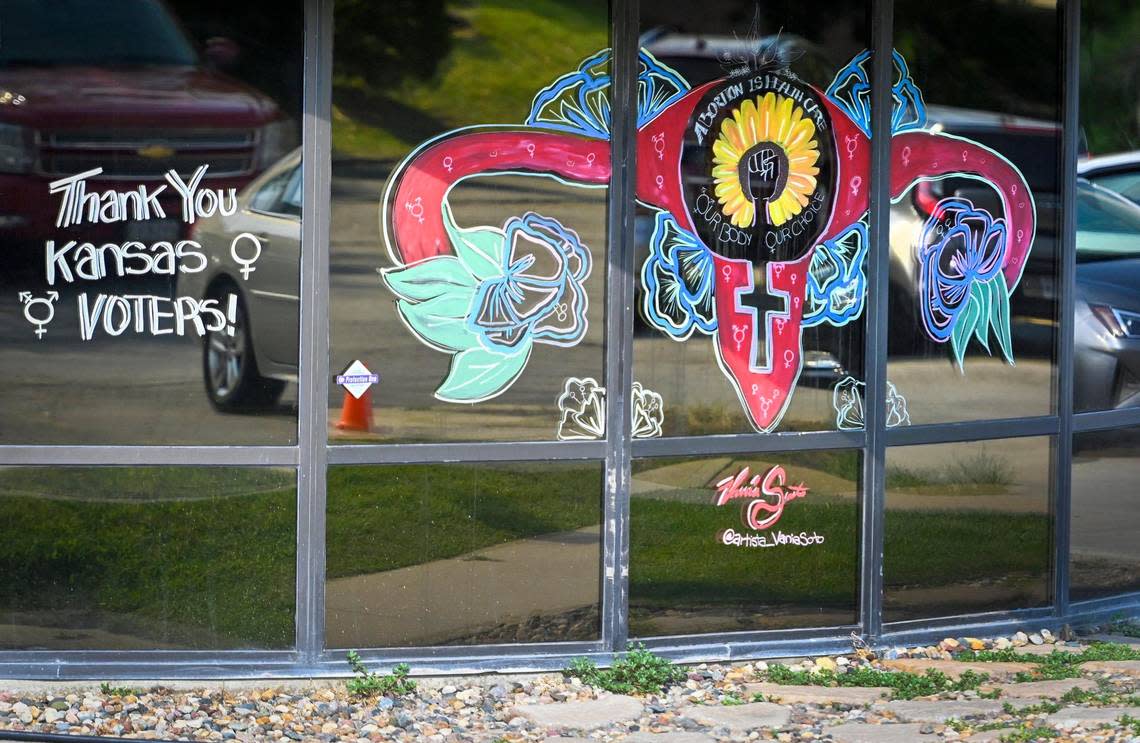
Location, location, location
Pregnancy resource centers are staffed mostly by women, some of whom have had abortions themselves.
Services vary from center to center. Some only provide information or counseling, while others also provide “limited medical services,” including limited obstetric ultrasounds.
Almost all provide free pregnancy tests, counseling, support groups, parenting classes, maternity and baby items “through pregnancy and years after the baby is born,” Niesen said.
“Many also are overseen by a medical director and can provide ultrasounds, STI (sexually transmitted infection) testing and treatment, and other medical assistance.”
The centers have long been integral to the work of the anti-abortion movement supported by church activism. Roman Catholic Archbishop Joseph Naumann has called them the “front line.”
Last month, Kansas voters soundly defeated a ballot initiative that would have amended the state constitution and removed the right to abortion.
Afterward, Naumann, leader of the Archdiocese of Kansas City in Kansas, doubled-down on the pregnancy centers.
“While we can’t protect women and children from abortion by the law, we can with love,” Naumann said. “This makes the work of our pregnancy resources centers even more important.”
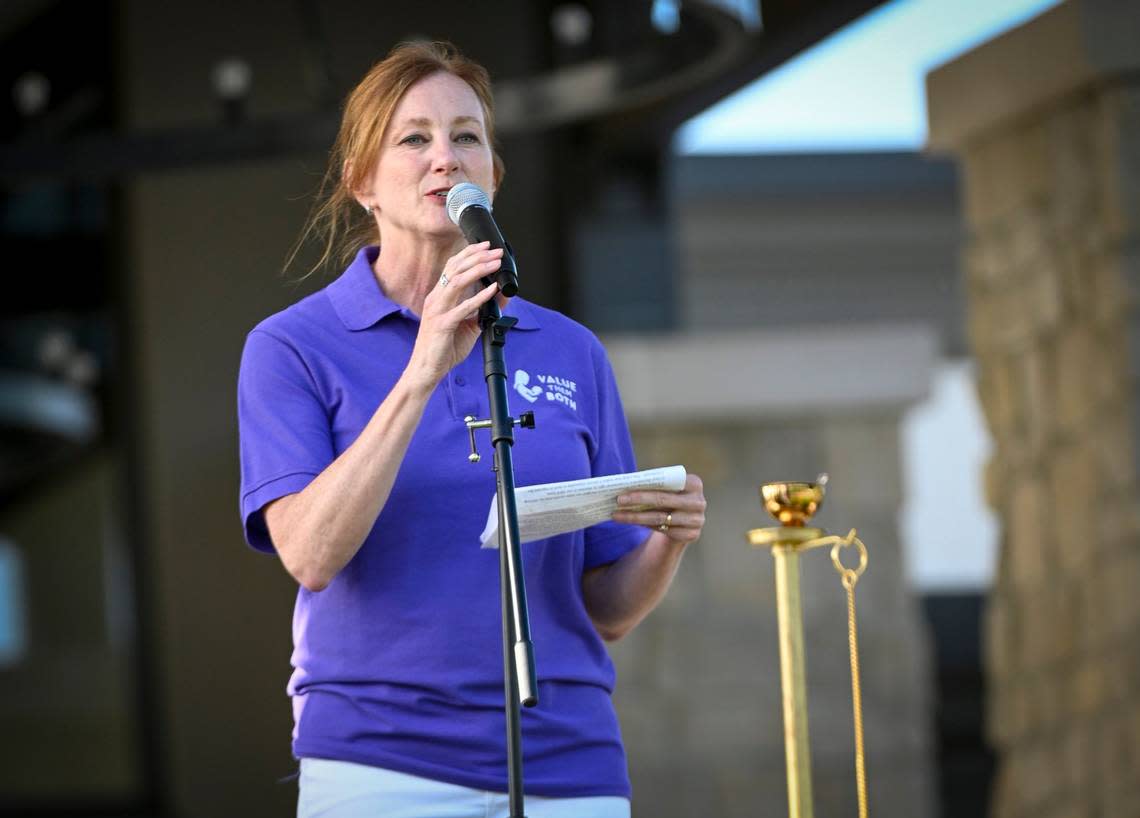
Across the four states served by Planned Parenthood Great Plains, pregnancy centers operate near most of their clinics, even ones that don’t provide abortion services, Wales said.
That’s a pain for Planned Parenthood; genius placement by the centers, some would say.
“I think the common theme is we are always in a location first and then at some point after, a crisis pregnancy center shows up close to us. It’s absolutely purposeful,” said Wales.
“At our health centers, we provide health care, and that means the comprehensive scope of reproductive and sexual services, including abortion, where we can, where it’s legal.
“And these centers often show up next to us because they know people often come to Planned Parenthood as a trusted provider of health care and information about options for women and pregnancy.”
Advice & Aid opened in the neighborhood in Johnson County in 2016, after Planned Parenthood. Tisdale said the bright blue sign in front of her building was not meant to mimic Planned Parenthood colors — Advice & Aid’s colors are blue and green — or to confuse people.
Advice & Aid’s sign declares: “Pregnancy and Abortion Information.”
“We try to make it really clear where you should come to us, but it’s very frequent we have patients who come to us, or come late to their appointments and say, ‘I accidentally went next door and I was really troubled by what happened,’” said Wales.
“We hear from patients from different crisis pregnancy centers — this is not just aimed at the one next to us in Overland Park — that they felt pressured.
“That they said no I really do want an abortion. Or no, I want Planned Parenthood and they felt like they weren’t allowed to leave. That they really had to argue that they know what they wanted, they were not looking for persuasion, they didn’t want to hear false information about how abortions cause breast cancer. That’s something we hear very commonly.
“So by the time they do get to us they’re really upset, they’re frustrated.”

Do you want to see the baby?
The front doors at Advice & Aid are always locked. When visitors get buzzed in, they walk down a few steps into a lobby with bright floral artwork on the walls and a colorful, homey rug on the floor.
A receptionist greets visitors from behind a glass partition like at a doctor’s office.
Beyond another set of locked doors off the lobby are private counseling rooms and two exam rooms equipped with ultrasound machines.
Tisdale said the sonograms are used for medical purposes, for seeing the viability of the pregnancy, for instance. Registered nurses trained to do limited ultrasounds have been doing the work, but Advice & Aid recently hired a registered sonographer.
More than half the pregnancy resource centers in the country are said to offer “non-diagnostic” ultrasounds, which do not study placenta or amniotic fluid, or detect fetal abnormalities. They are typically offered for free, which troubles Wales.
Advertising free ultrasounds “leads people to think there is a full scope of care,” said the Planned Parenthood leader.
“If I can come in and you have an ultrasound machine and I lie down on what looks like a medical bed in a medical exam room, then I’m assuming that I can get services from you. But often that is the only service outside of persuasion information.”
The American Institute of Ultrasound in Medicine strongly discourages nonmedical uses of ultrasound.
“The use of ultrasound without a medical indication to view the fetus, obtain images of the fetus, or identify the fetal external genitalia is inappropriate and contrary to responsible medical practice,” the professional organization says.
Last year when Tennessee lawmakers approved money to place several ultrasound machines in pregnancy centers, Republican Gov. Bill Lee said the purchase was critical for dissuading patients considering abortion.
Resource Health began offering “life-affirming” ultrasounds in 1996.
“Ultrasound images helped the unborn children audition for their lives as they were introduced to moms and dads for the first time,” the center’s website says.
That’s how it happened for Stacie, a Kansas City mom. (She asked to be identified by her first name only for privacy reasons.)
The 30-year-old former client of Advice & Aid said seeing the sonogram image made her unplanned pregnancy seem real, not surreal.
She didn’t have any friends or family, or the baby’s father, to lean on when she unexpectedly got pregnant at 21. She was working on a nursing degree while holding down a part-time job.
She was scared and felt like a failure.
“My family was very disappointed in me,” she said.
She called around town to make an appointment for an ultrasound. Advice & Aid was the first place that told her come in now, it’s free.
“I wasn’t pressured for any decision,” she said. “Of course, they stand for life. … They want to support life. That’s why hearing that heartbeat was so important. When I heard that heartbeat … I went to the bathroom to cry.”
In that moment, she said, she dropped abortion as an option.
While she was pregnant she went to weekly parenting classes at Advice & Aid, earning points she redeemed for free baby clothes and a car seat. After the baby was born she joined another parents’ group there for two years.
Her daughter — spunky, lots of personality, ‘like two kids in one” — turned 8 in July.
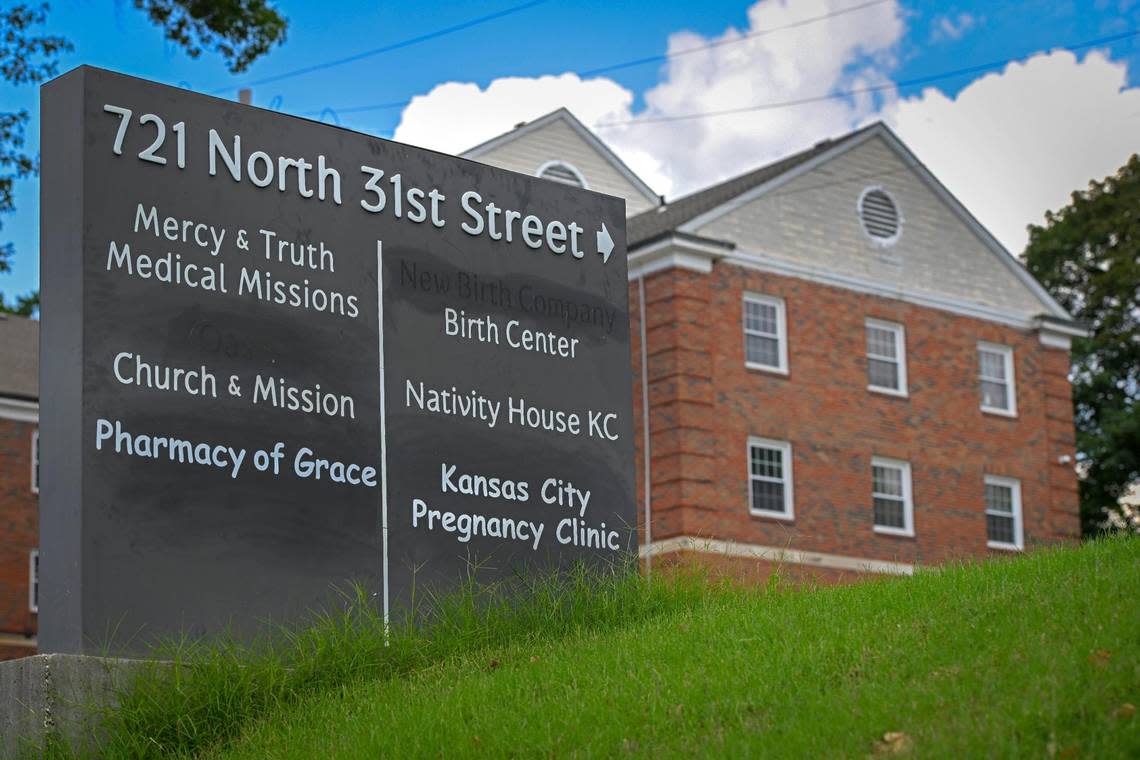
Help from a Chiefs player, taxpayers
In March about 300 people attended a Mardi Gras banquet at Children’s Mercy Park, the first fundraiser for one of the newest pregnancy resource centers in Kansas City, the Kansas City Pregnancy Clinic in Wyandotte County.
During the cocktail hour people posed for photos with Harrison Butker, kicker for the Kansas City Chiefs who also campaigned for the unsuccessful Value Them Both anti-abortion effort in Kansas. He autographed helmets and other items that were auctioned.
Pregnancy centers are nonprofits that largely rely on fundraisers, grant money and donations from individual supporters, private foundations, churches and businesses.
The Kansas archdiocese does not run any pregnancy resource centers, but supports them with grants and by helping raise public awareness about their services, said Niesen.
The Diocese of Kansas City-St. Joseph does not fund or manage any pregnancy resource centers, a diocese spokeswoman said.
But increasingly, more of the centers are receiving money from another source: taxpayers.
Pregnancy centers in more than 30 states receive state funding through various means, and policy changes announced in June give them access to funds through the federal Title X program that provides comprehensive family planning and preventive health services.
The Associated Press analysis found that pregnancy resource centers receive tens of millions of tax dollars — a nearly fivefold increase from a decade ago “that resulted from an often-overlooked effort by mostly Republican-led states.”
State budget figures revealed that nearly $89 million was allocated to centers in about a dozen states this fiscal year, compared to about $17 million in about eight states 10 years ago, the AP reported.
Texas, where abortion is effectively banned, leads the pack, with state lawmakers dedicating $100 million over the next two years to programs that offer abortion alternatives.
Kansas contributes far less. The Senator Stan Clark Pregnancy Maintenance Initiative — named after a leading Republican conservative who died in 2004 — provided nearly $339,000 in grants last fiscal year to Kansas nonprofits that provide services that help women carry to term.
The 10 grant recipients included three county health departments, Catholic Charities — and two crisis pregnancy centers in Wichita and Arkansas City that received about $74,000 between the two of them.
The Kansas Catholic Conference is exploring possibilities of expanding that initiative, whose rules and regulations need updating, executive director Chuck Weber said.
“If the abortion industry is anticipating a 1,300%+ increase in abortions in Kansas, it seems a more-than-reasonable number for financial support of (pregnancy resource centers) would be a similar number,” said Weber.
In Missouri, a 2019 bill created the trigger law outlawing almost all abortion with the downfall of Roe v. Wade. That same “provision beefed up tax credits for Missouri taxpayers who donate money to pregnancy resource centers,” ProPublica reported in June.
The expanded tax credits were in addition to a record $8 million in funding for the centers allocated for this fiscal year, according to ProPublica.
Missouri “has long been one of the nation’s leading suppliers of tax dollars for pregnancy resource centers,” the nonprofit newsroom reported.
Former Missouri state Rep. Deb Lavender opposes state funding for the centers because they are largely unregulated and, she said, are not always forthcoming about their mission.
“There’s no medical accuracy that’s required. And I think they bald-face lie to women. It’s about as much of a scam medically as you can get,” said Lavender, a Kirkwood Democrat who opposed that state funding when she served. In 2020 she lost a Senate race to state Sen. Andrew Koenig, a staunch anti-abortion legislator. Lavender is running for another term in the House.
“I’m not saying the people aren’t good-hearted or feel they have a mission in life and they want to help. But if what you’re doing is so honorable, then why do you scam people to walk in your door instead of Planned Parenthood’s?” said Lavender.

A center rebrands
Last month an analysis by Bloomberg News revealed that Google Maps routinely misled people looking for abortion providers and that the inaccurate information had consequences. It reported the experience of a 19-year-old Florida college sophomore who used Google Maps to find an abortion clinic.
The search results led her instead to a crisis pregnancy center where she said she was given a rubber fetus and pamphlets that claimed abortion leads to mental health problems and a higher risk of breast cancer, two commonly made assertions widely debunked by medical associations.
The American College of Obstetricians and Gynecologists and the National Cancer Institute, for instance, both say years of scientific evidence reveal no link between higher risk of breast cancer and abortion.
Tisdale said when people walk in by mistake “we let them know we’re not the abortion clinic.” Some centers say on their websites they don’t provide abortion services or referrals, but that detail is sometimes tucked toward the bottom of a home page.
Pregnancy centers meet women in crisis mode who are “very conflicted about their situation. This situation is not something that they wanted and it’s going to affect other difficult circumstances they are in,” said Tisdale, whose philosophy is to slow them down, calm them as they make a decision that will affect the rest of their life.
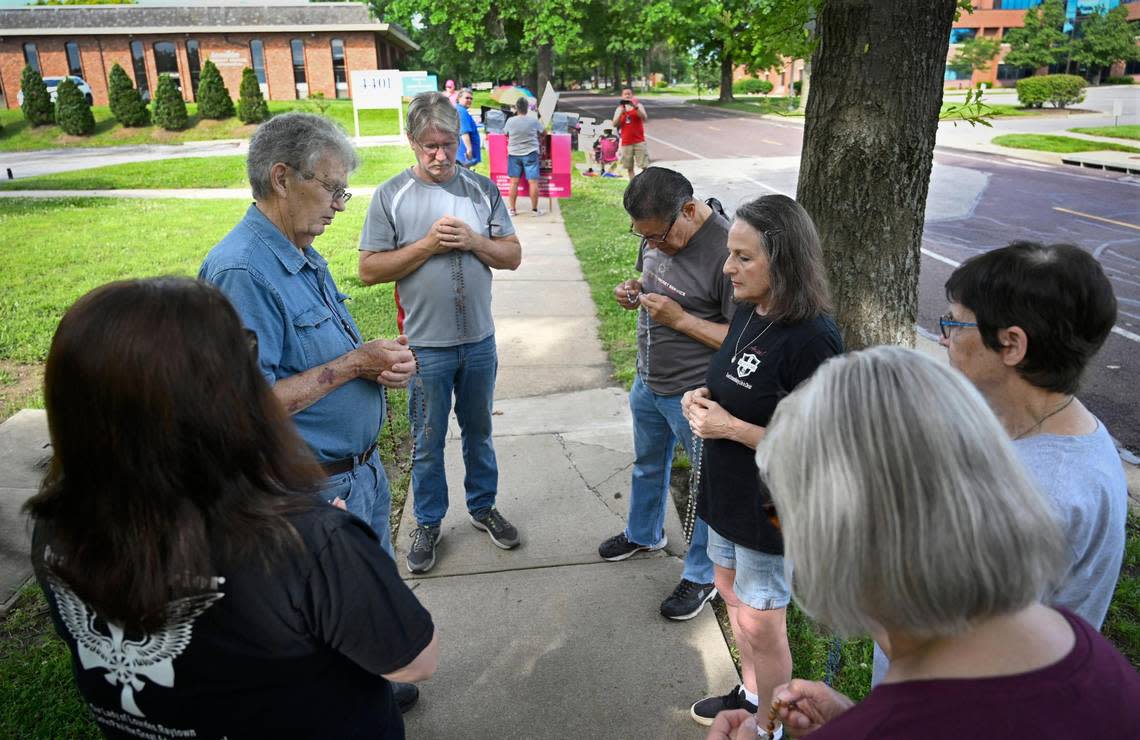
At Resource Health, Gross has seen “a significant shift” in the past five or six years in the reasons why women consider abortion. Now, the No. 1 issue is day care.
“The stats are 61% of women considering abortion already have children. So for them it’s not often about I don’t know how to care for a baby. Often it’s I can’t take another baby, I can’t take care of another baby. I can’t feed another baby, I can’t pay for child care for another baby,” said Gross.
“That’s part of why we rebranded our name to be Resource Health, in that we feel like abortion is often a resource issue. I think sometimes, culturally, while there is the sanctity of life issue and always will be, and while we believe those things to be true, often for our clients it’s a resource issue. I don’t have the resources for this, I don’t have the resources for that.
“And if those are things that we can address and we can help do them or somebody can help do them, there’s no reason why somebody should have to choose to have an abortion because of resources.”
Even before this year’s Roe v. Wade decision, Resource Health set up a 24/7, virtual hotline staffed by registered nurses for people who can’t make it to one of their locations. And a new program for fathers corrects what Gross considers a problem in the anti-abortion movement.
“One of the things we really started looking at in the face five years ago was, historically, in the pro-life movement overall we’ve made the dad, the man, feel like he is an outsider, a spectator, instead of a participant,” she said.
“And sometimes even villainized him into being the bad guy rather than giving him a voice and opportunity to really be able to express what he feels to mom or really, say you know what, we can do this, we can do this together.”
The other day, a young man walked up to Advice & Aid as it was closing and asked Tisdale: “So do you tell me where to get the abortion if you don’t do it?”
She told him, “We don’t refer for abortions. You just Google it.”
All he had to do was turn around, look across the parking lot and see Planned Parenthood next door, which right now has a colorful painting of fallopian tubes on the front window, a thank-you to Kansas voters for supporting abortion rights.
“If he asks me point blank is that the abortion clinic, I’m going to say yes,” said Tisdale. “I’m not going to lie to them either because we … have somebody bigger to answer to than just society here on this earth.”
